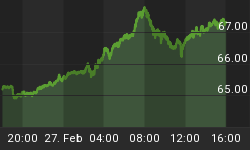It is an understatement of grand proportions to say the financial markets are complex and have a lot of moving parts. Therefore, looking at what is actually happening vs. being overly concerned about what may happen next is a good way to stay in line with the forces of supply and demand.
Employment Data Aligned With Markets
The bullish employment report may have come as a surprise to many, but as we describe below, the markets were dropping bullish hints prior to Friday's announcement. The recap of the employment data from Bloomberg:
Payrolls expanded by 165,000 workers last month following a revised 138,000 increase in March that was larger than first estimated, Labor Department figures showed today in Washington. The median forecast of 90 economists surveyed by Bloomberg projected a 140,000 gain. Revisions to the prior two months' reports added a total of 114,000 jobs to the employment count in February and March.
Trend Still Favored Stock Bulls
The conditions described below allowed us to enter Friday's session with long positions and no exposure to the short side of the market. How can these charts help us going forward? They still favor bullish outcomes for stocks. Until something "flips" on the charts, the odds will favor risk assets over defensive assets.
On April 30 we covered three areas of the market that were starting to turn back toward the bullish stock market camp. One of them examined the weekly trend in the S&P 500 Index. Moving averages help us filter out some day-to-day volatility and focus on the longer-term trend. The most favorable conditions for stocks occur when the following are in place: (a) price (black line) is above both moving averages (blue and red), (b) the faster moving average is above the slower moving average (blue above red), and (c) the slopes of the moving averages are positive. A "bearish look" from a trend perspective is described via the red text in the chart below. Below is a version of the chart the day before Friday's widely-watched employment report. Notice the chart looked healthy and bullish.

The Fear Trade Was Still Lagging
After Wednesday's 14 point drop in the S&P 500, we stated the declines were not all that meaningful in terms of impacting the bullish trends. We also tweeted an updated version of the bond (AGG) vs. stock (SPY) chart below after Thursday's close stating bonds had some work to do relative to stocks.

Below is a version of the bond vs. stock chart heading into Friday's monthly employment report.

Breadth Was Also Improving
Another tell on the employment front was market breadth. We showed a version of the chart below on April 30. Market breadth speaks to the percentage of stocks participating in a rally. Healthy markets have broad participation. The Summation Index, shown below, is an intermediate-term measure of market breadth. All things being equal, bulls would prefer to see the line rise on the chart below. The Summation Index recently initiated an attempt at a reversal as ECB rate cut chatter increased.

Markets Improved After April 18 Low
The markets looked vulnerable the week of April 14. However, after the S&P 500's low on April 18, things began to improve on April 23 when weak data from Europe increased the odds of an interest rate cut in Europe. Since then, the charts above also pointed to a more positive outlook. Asset classes and market breadth were dropping hints that a favorable employment report was coming on Friday. As we will find more often than not, the markets were right. If another leg up is in the cards, foreign (EFA) and technology stocks (QQQ) may provide leadership.















